
"Funkytown" is a song by American disco-funk group Lipps Inc., written and produced by Steven Greenberg and released by Casablanca Records in March 1980 as the second single from the group's 1979 debut studio album Mouth to Mouth.
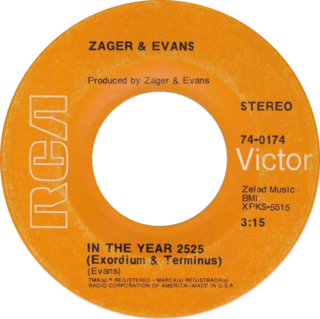
"In the Year 2525 " is a 1969 hit song by the American pop-rock duo of Zager and Evans. It reached No. 1 on the Billboard Hot 100 for six weeks commencing July 12, 1969. It peaked at No. 1 in the UK Singles Chart for three weeks in August and September that year. The song was written and composed by Rick Evans in 1964 and released on Truth Records in 1968. It was picked up by RCA Records. Zager and Evans disbanded in 1971.
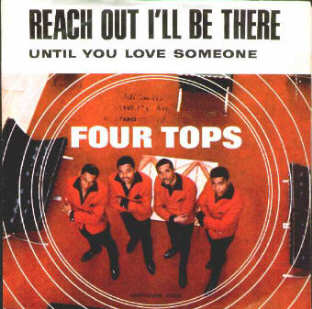
"Reach Out I'll Be There" (also formatted as "Reach Out (I'll Be There)") is a song recorded by the American vocal quartet Four Tops from their fourth studio album, Reach Out (1967). Written and produced by Motown's main production team, Holland–Dozier–Holland, the song is one of the most widely-known Motown hits of the 1960s and is today considered the Four Tops' signature song.

"I'm a Believer" is a song written by Neil Diamond and recorded by the American band the Monkees in 1966 with the lead vocals by Micky Dolenz. The single, produced by Jeff Barry, hit the number-one spot on the U.S. Billboard Hot 100 chart for the week ending December 31, 1966, and remained there for seven weeks becoming the last number-one hit of 1966 and the biggest-selling single for all of 1967. Billboard ranked the record as the number-five song for 1967. While originally published by Screen Gems-Columbia Music (BMI), it is now published by Stonebridge Music/EMI Foray Music (SESAC), with administration passed to Sony Music Publishing and Universal Music Publishing Group.

"Angel of the Morning" is a popular song written by Chip Taylor, originally recorded by Evie Sands but which first charted with a version by Merrilee Rush. The song has been covered by many artists including Chrissie Hynde, Dusty Springfield, P. P. Arnold, Connie Eaton, Mary Mason, Guys 'n' Dolls, Melba Montgomery, Olivia Newton-John and Juice Newton, who reached the Billboard Top Ten with her version in the early 1980s.

Crispian St. Peters was an English pop singer-songwriter, best known for his work in the 1960s, particularly hit songs written by the duo The Changin' Times, including "The Pied Piper", and Ian & Sylvia's "You Were on My Mind". His popularity waned after he claimed he was a better performer than other well known singers and declared that he was a better songwriter than the Beatles.
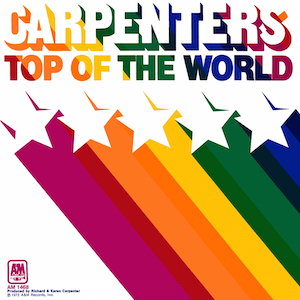
"Top of the World" is a 1972 song written and composed by Richard Carpenter and John Bettis and first recorded by American pop duo Carpenters. It was a Billboard Hot 100 No. 1 hit for the duo for two consecutive weeks in 1973. It also became Carpenters' second number one and tenth top-ten single in the Billboard Hot 100.

"Green Tambourine" is a song written and composed by Paul Leka and Shelley Pinz. It was the biggest hit by the 1960s Ohio-based rock group the Lemon Pipers, as well as the title track of their debut album, Green Tambourine. The song was one of the first psychedelic pop chart-toppers and became a gold record.

"You Send Me" is a song written and originally recorded by American singer Sam Cooke, released as a single in 1957 by Keen Records. Produced by Bumps Blackwell and arranged and conducted by René Hall. The song, Cooke's debut single, was a massive commercial success, becoming a No. 1 hit on both Billboard's Rhythm & Blues Records chart and the Billboard Hot 100.

"Sky Pilot" is a 1968 song by Eric Burdon & the Animals, released on the album The Twain Shall Meet. When released as a single the song was split across both sides, due to its length (7:27). As "Sky Pilot " it reached number 14 on the U.S. pop charts, number 15 on the Canadian RPM chart, and number 7 on Canada's CHUM Chart.

"Bang Bang (My Baby Shot Me Down)" is the second single by American singer-actress Cher from her second album, The Sonny Side of Chér (1966). It was written by her husband Sonny Bono and released in 1966. It reached No. 3 in the UK Singles Chart and No. 2 on the Billboard Hot 100 for a week (behind "(You're My) Soul and Inspiration" by The Righteous Brothers), eventually becoming one of Cher's biggest-selling singles of the 1960s.
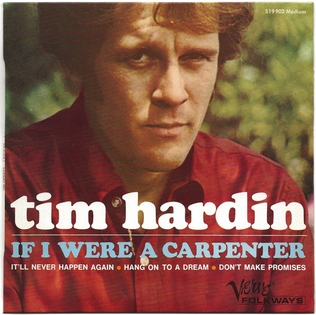
"If I Were a Carpenter" is a folk song written by Tim Hardin in the 1960s, and re-recorded with commercial success by various artists including Bobby Darin, The Four Tops and Johnny Cash. Hardin's own recording of the piece appeared on his 1967 album Tim Hardin 2. It was one of two songs from that release performed by Hardin at Woodstock in 1969. The song, believed by some to be about male romantic insecurity, is rumored to have been inspired by his love for actress Susan Morss, as well as the construction of Hardin's recording studio.
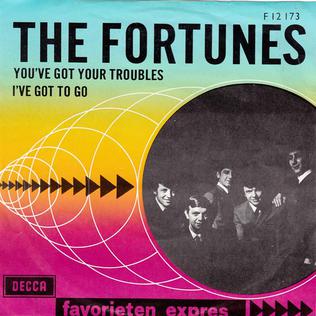
"You've Got Your Troubles" was the inaugural composition by the prolific songwriting team of Roger Cook and Roger Greenaway in 1964. "You've Got Your Troubles" became a number 2 UK hit for the Fortunes in the United Kingdom in August 1965, affording the group international success including a Top Ten ranking in the US. The track was included on the Fortunes' self-titled 1965 debut album release, the group's only album release of the 1960s.

"Under the Boardwalk" is a pop song written by Kenny Young and Arthur Resnick and recorded by The Drifters in 1964. It charted at number four on the Billboard Hot 100 chart on August 22, 1964. The song has since been covered by many other artists, with versions by Bette Midler, Sam & Dave, Tom Tom Club, The Rolling Stones, Billy Joe Royal, The Beach Boys, Bruce Willis, Bad Boys Blue, John Mellencamp and Lynn Anderson all charting in the United States or overseas. The song ranked number 487 on Rolling Stone's list of The 500 Greatest Songs of All Time in 2004 and number 489 in 2010.
"Winchester Cathedral" is a song by the New Vaudeville Band, a British novelty group established by the song's composer, Geoff Stephens, and was released in late 1966 by Fontana Records.

"Georgy Girl" is a song by the Australian pop/folk music group the Seekers. It was used as the title song for the 1966 British romantic comedy film Georgy Girl. Tom Springfield, who had written "I'll Never Find Another You" for the Seekers, composed the music and Jim Dale supplied the lyrics. The song is heard at both the beginning and end of the film, with markedly different lyrics. It was nominated for an Academy Award for Best Original Song but the prize went to "Born Free". It was performed at the 1967 Oscars ceremony by Mitzi Gaynor.
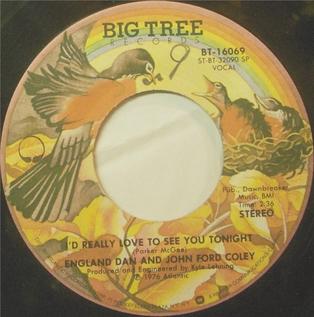
"I'd Really Love to See You Tonight" is a song written by Parker McGee and recorded by England Dan & John Ford Coley from their 1976 album Nights Are Forever. It eventually peaked at No. 2 on the Billboard Hot 100 chart for two weeks, behind Wild Cherry's "Play That Funky Music" and No. 1 on the Easy Listening chart. Billboard ranked it as the No. 21 song for 1976. It also reached No. 26 on the UK Singles Chart.

"Gimme Dat Ding" is a 1970 popular UK song, of the novelty type, sung by "one-hit wonder" The Pipkins, and written and composed by Albert Hammond and Mike Hazlewood. Released as a single, it is the title selection of an album which The Pipkins recorded and released on the EMI Columbia Records label. It also appeared on a compilation album of the same name, which The Pipkins shared with another up-and-coming UK group, The Sweet. It has also been included on many other compilation albums. "Gimme Dat Ding" was arranged by Big Jim Sullivan.

"Any Way That You Want Me" is a song written by Chip Taylor that was first released in September 1966 by Tina Mason as the B-side to her single "Finders Keepers". It has been covered by a number of artists, with the most successful version being by English rock band the Troggs.
"Mama" is a song by American singer B. J. Thomas, released in March 1966 as a single from his debut album I'm So Lonesome I Could Cry. It peaked at number 22 on the Billboard Hot 100 and was later covered by British singer Dave Berry, whose version became a top-ten hit in the UK.


















